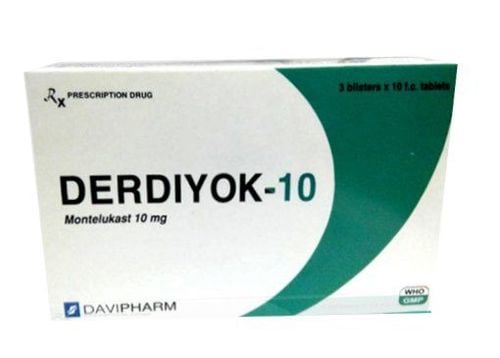This is an automatically translated article.
Kacerin has anti-allergic effects, so it is often indicated in the treatment of allergic rhinitis, chronic idiopathic urticaria and allergic asthma. Kacerin is contraindicated for children under 2 years of age and people with hypersensitivity to its components.1. Learn about the drug Kacerin
Kacerin is an oral medication containing the main ingredient Cetirizine 2HCL (Cetirizine dihydroxyzin) with a strength of 10mg. The drug also contains a number of other excipients with a dose sufficient for one tablet. Pharmacodynamics: Cetirizine 2HCL works by inhibiting histamine-mediated allergic reactions in the body. This helps prevent the migration of inflammatory cells. Cetirizine 2HCL has no antagonistic effect on other receptors such as Acetylcholine and Serotonin. Pharmacokinetics: When using the drug, the concentration of cetirizine in the blood will reach a maximum of 0.3 micrograms / ml after taking 1 tablet from 30 to 60 minutes. There was no difference in drug absorption between subjects. In the kidney, cetirizine concentrations have a clearance rate of about 30 ml/min. This substance also has a strong ability to bind to plasma proteins.
2. What disease does Kacerin treat?
Uses of Kacerin are:
Treatment of seasonal or non-seasonal allergic rhinitis, year-round allergic rhinitis, seasonal allergic rhinitis; Kacerin medicine for the treatment of chronic urticaria of unknown cause; Treatment of asthma caused by allergies; Treatment of embossed skin disease; The use of Kacerin is to treat Quincke's edema; Improve symptoms such as sneezing, runny nose, stuffy nose, itching caused by allergic rhinitis; Treatment of allergic conjunctivitis. Your doctor may also prescribe Kacerin 10mg for other purposes not listed above.
3. Contraindications to the use of the drug Kacerin
Kacerin drug is not used for the following subjects:
Kacerin is contraindicated in patients with a history of allergy to Cetirizine and Hydroxyzin. Not indicated for use in children under 2 years of age. Contraindicated for children aged 2-6 years with liver dysfunction or renal failure. 4. Dosage and how to use Kacerin How to use Kacerin:
The correct use of Kacerin will increase the effectiveness of treatment. Therefore, you should carefully read the manufacturer's instructions for use attached to the box and use it exactly as prescribed by your doctor; Take Kacerin at the right dose and for the full time as directed. Do not increase or decrease the dose yourself or stop taking the medicine without your doctor's permission; Take Kacerin by mouth. Patients should not take the medicine on an empty stomach. The best time to take the drug is during or after a meal and swallow the Kacerin tablet whole with plenty of water. If using the drug in other forms such as breaking, dissolving, consult your doctor to make sure that doing this will not affect the effect of the drug; Do not use Kacerin when it has expired or has changes in shape and color. Dosage of Kacerin is recommended for each specific subject as follows:
Children < 6 years old: Take Kacerin as prescribed by a doctor; Children from 6 years old and adults: Each time take 1 tablet of Kacerin x 2 times/day; Patients with renal failure (GFR 11-31 ml/min): Take 1/2 tablet of Kacerin x 1 time per day; Patients on hemodialysis (GFR < 7 ml/min): Each time take 1/2 tablet of Kacerin x 1 time/day; People with liver failure: Take 1/2 tablet of Kacerin x 1 time/day.
5. Side effects of the drug Kacerin
Kacerin rarely causes side effects. If so, they are only mild and transient as follows:
Nausea or vomiting; Dizzy; Full stomach; Undigested; Headache; Dry mouth . If these side effects persist or you experience more severe symptoms, stop taking the medicine and notify your doctor for appropriate treatment.
6. Notes when using the drug Kacerin
Recommendations for use:
Kacerin does not cause drowsiness like some other antihistamines, so it can be used when driving or operating machinery. It is important for the patient to take the correct dose prescribed by the doctor. Dosage of Kacerin in patients with hepatic and renal impairment is usually lower than in other subjects. These subjects need to be guided and closely monitored when using the drug. For pregnant women and breast-feeding: Kacerin can cause adverse effects on the health of pregnant women. Components of Kacerin can also enter the mammary glands. Therefore, pregnant and lactating women are not recommended to use this drug. When taking Kacerin drug deficiency or overdose:
You may experience side effects when taking Kacerin overdose. If it's too severe, try to induce vomiting to get the medicine out. Then, ask a loved one to take him to a medical facility for timely treatment. In case you forget to take a dose, take it as soon as you remember. But if it is almost time for your next dose, skip the missed dose. Do not combine 2 doses of Kacerin to make up. Drug Interactions:
Tobacco, alcohol and other CNS depressants can interact with Kacerin making you face many side effects. Therefore, it is best to avoid using them at the same time. If you are taking other medications, check with your doctor to make sure they don't interact when taken at the same time. Store Kacerin at a temperature below 30 degrees Celsius. Avoid storing it in the bathroom, freezer or humid place. Do not expose Kacerin to sunlight.
Above is information about the uses, dosage and usage of Kacerin. To ensure safety for health, patients should carefully read the instructions for use, consult a doctor before use. Absolutely do not buy medicine without a doctor's prescription because there may be unwanted side effects.
Please dial HOTLINE for more information or register for an appointment HERE. Download MyVinmec app to make appointments faster and to manage your bookings easily.













